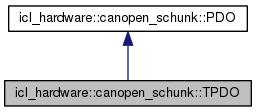This class describes Transmit PDOs, meaning PDOs that send data from the device to the host. More...
#include <TPDO.h>

Public Types | |
| typedef boost::shared_ptr< TPDO > | Ptr |
| Convenience typedef to use PDOs with shared pointers. | |
| typedef std::vector < boost::shared_ptr< TPDO > > | PtrList |
| Convenience typedef to use PDO lists with shared pointers. | |
Public Member Functions | |
| PDOStringMatchVec | appendMapping (SDO &sdo, const MappingConfigurationList &mappings, const eTransmissionType &transmission_type, const bool dummy_mapping=false, const uint8_t cyclic_timeout_cycles=0) |
| Appends one or more mapping parameters to the existing mapping. Note that the PDO will be disabled while appending another mapping. | |
| void | registerNotifyCallback (const boost::function< void()> &f) |
| Register a notification callback function for incoming PDO messages. | |
| PDOStringMatchVec | remap (SDO &sdo, const MappingConfigurationList &mappings, const eTransmissionType &transmission_type, const bool dummy_mapping=false, const uint8_t cyclic_timeout_cycles=0) |
| Configure a PDO by sending some SDO packages. This can be either done during NMT state pre-operational or during the NMT state Operational. If an empty mapping is given, we leave the mapping as is. | |
| TPDO (const uint8_t node_id, const uint8_t pdo_nr, const CanDevPtr &can_device) | |
| Construct a new TPDO. | |
| void | update (const CanMsg &msg) |
| update updates the TPDO data with newly received messages | |
| void | upload () |
| Upload data from the slave to the master (Node to PC) | |
Static Public Attributes | |
| static const uint16_t | OD_TPDO_COMMUNICATION_MIN = 0x1800 |
| static const uint16_t | OD_TPDO_MAPPING_PARAMETER_MIN = 0x1A00 |
Private Attributes | |
| std::vector< uint8_t > | m_data_buffer |
| boost::mutex | m_data_buffer_mutex |
| boost::condition_variable | m_data_buffer_updated_cond |
| bool | m_data_update_received |
| std::vector< boost::function < void()> > | m_notify_callbacks |
Detailed Description
This class describes Transmit PDOs, meaning PDOs that send data from the device to the host.
Member Typedef Documentation
| typedef boost::shared_ptr<TPDO> icl_hardware::canopen_schunk::TPDO::Ptr |
Convenience typedef to use PDOs with shared pointers.
Reimplemented from icl_hardware::canopen_schunk::PDO.
| typedef std::vector<boost::shared_ptr<TPDO> > icl_hardware::canopen_schunk::TPDO::PtrList |
Convenience typedef to use PDO lists with shared pointers.
Reimplemented from icl_hardware::canopen_schunk::PDO.
Constructor & Destructor Documentation
| icl_hardware::canopen_schunk::TPDO::TPDO | ( | const uint8_t | node_id, |
| const uint8_t | pdo_nr, | ||
| const CanDevPtr & | can_device | ||
| ) |
Member Function Documentation
| PDO::PDOStringMatchVec icl_hardware::canopen_schunk::TPDO::appendMapping | ( | SDO & | sdo, |
| const MappingConfigurationList & | mappings, | ||
| const eTransmissionType & | transmission_type, | ||
| const bool | dummy_mapping = false, |
||
| const uint8_t | cyclic_timeout_cycles = 0 |
||
| ) |
Appends one or more mapping parameters to the existing mapping. Note that the PDO will be disabled while appending another mapping.
- Note:
- Do not call this method by hand, but use the wrapper functions in the DS301Node class. Otherwise the node will not know of the new mapping and won't be able to find a PDO by it's identifier string.
- Parameters:
-
sdo Handle to the SDO object mappings List of MappingConfigurations that should be mapped into this PDO transmission_type Transmission type of this PDO dummy_mapping if set to True, no download to the device will be performed, but the mapping will be done on host side. This is especially useful if a device has preconfigured PDOs which you like to use. cyclic_timeout_cycles If the transmission type SYNCHRONOUS_CYCLIC is used, this parameter defines the PDO's frequency by defining the number of cycles between two send attempts. For example, a parameter value of 4 means, that the PDO is sent every 5th cycle.
- Returns:
- PDOStringMatchVec Vector of string to vec_index matchings. If an error occurs, the returned vector will be empty.
| void icl_hardware::canopen_schunk::TPDO::registerNotifyCallback | ( | const boost::function< void()> & | f | ) |
Register a notification callback function for incoming PDO messages.
- Parameters:
-
f Notification function that should be called
| PDO::PDOStringMatchVec icl_hardware::canopen_schunk::TPDO::remap | ( | SDO & | sdo, |
| const MappingConfigurationList & | mappings, | ||
| const eTransmissionType & | transmission_type, | ||
| const bool | dummy_mapping = false, |
||
| const uint8_t | cyclic_timeout_cycles = 0 |
||
| ) |
Configure a PDO by sending some SDO packages. This can be either done during NMT state pre-operational or during the NMT state Operational. If an empty mapping is given, we leave the mapping as is.
- Note:
- Do not call this method by hand, but use the wrapper functions in the DS301Node class. Otherwise the node will not know of the new mapping and won't be able to find a PDO by it's identifier string.
- Parameters:
-
sdo Handle to the SDO object mappings List of MappingConfigurations that should be mapped into this PDO transmission_type Transmission type of this PDO dummy_mapping if set to True, no download to the device will be performed, but the mapping will be done on host side. This is especially useful if a device has preconfigured PDOs which you like to use. cyclic_timeout_cycles If the transmission type SYNCHRONOUS_CYCLIC is used, this parameter defines the PDO's frequency by defining the number of cycles between two send attempts. For example, a parameter value of 4 means, that the PDO is sent every 5th cycle.
- Returns:
- PDOStringMatchVec Vector of string to vec_index matchings. If an error occurs, the returned vector will be empty.
| void icl_hardware::canopen_schunk::TPDO::update | ( | const CanMsg & | msg | ) |
Member Data Documentation
boost::mutex icl_hardware::canopen_schunk::TPDO::m_data_buffer_mutex [private] |
boost::condition_variable icl_hardware::canopen_schunk::TPDO::m_data_buffer_updated_cond [private] |
bool icl_hardware::canopen_schunk::TPDO::m_data_update_received [private] |
std::vector<boost::function <void()> > icl_hardware::canopen_schunk::TPDO::m_notify_callbacks [private] |
const uint16_t icl_hardware::canopen_schunk::TPDO::OD_TPDO_COMMUNICATION_MIN = 0x1800 [static] |
const uint16_t icl_hardware::canopen_schunk::TPDO::OD_TPDO_MAPPING_PARAMETER_MIN = 0x1A00 [static] |
The documentation for this class was generated from the following files: